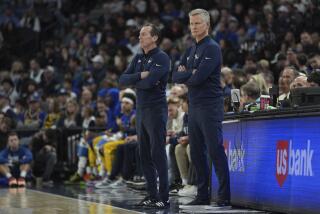ANALYSIS : The Forgotten Man Behind the Bulls’ Rise
- Share via
CHICAGO — For the game-winning plays at the end Sunday night, the Chicago Bulls summoned Horace Grant and reserve John Paxson--bypassing all-timer Michael Jordan--as they often have during Phil Jackson’s tenure as the leader of the three-time NBA champions.
Not that every sports fan can identify Jackson as their coach.
Even in Chicago, there are three widely shared misperceptions:
--Jordan coaches the team himself.
--Anybody could coach it.
--Nobody needs to.
The gripping question though, as the Bulls were closing out the Phoenix Suns, was: What exactly does Jackson do?
It might not be easy to see, but the truth is that, more than anyone else in Chicago, Jackson means championships.
As a head coach, he began spectacularly by converting Jordan into a team player--against Jordan’s will. That changed a great player into a winner, and recast the Bulls as champions.
But such is the brilliance of Jordan that, at the same time, Jackson was catapulted into an unwanted category: Most underrated coach in America today.
Those who keep files on forgotten facts might want to consider this: As nifty as Jordan is--and certainly, he stands tall among the nation’s most gifted athletes--he spent his first six NBA seasons as a non-champion who never even played in a championship game.
Not until Jackson reorganized the Bulls did they finally bring an NBA title to Chicago in 1991.
If Jackson’s role on the team is widely misunderstood and underrated, the missing link is a recognition among sports fans that in the rise of the Bulls, Jackson and Jordan have done it together.
The hand of Jackson is most clearly seen in these respects:
--He has reined in and changed Jordan drastically, without upsetting him.
Like all great basketball players, Jordan is an accomplished free-lancer who prefers a one-man game. His critics for years called him a peerless individualist who would never be an NBA champion.
Jackson convinced Jordan that to get there, he would have to fit into a structured team concept of basketball. More significantly, Jackson made the sale without beating down Jordan’s spirit or psyche. In general, he did it indirectly, implicitly, driving Jordan to come up with the answers himself.
An assertive offensive player, Jordan, with Jackson’s approval, still takes over unilaterally when necessary. But the turning point in the rise of the Bulls was Jordan’s acceptance of Jackson’s proposition that no one player, no matter how wonderful, can win them all.
--Jackson motivates his players unconventionally, buying them books, prescribing sightseeing trips, etc. This year, instead of pushing and pressuring the Bulls into the playoffs, he let things happen, in Scottie Pippen’s language. Most coaches fear that if they relax that much, they can’t get it back.
--Finally, he aims to democratically involve everybody, all players and coaches, equally.
His team is one of the few to have won clutch playoff games with as many as four substitutes on the floor in the final-moment crunch.
Jackson may also employ the world’s oldest assistants, Tex Winter and John Bach, who can incredibly look back on nearly a century, combined, of coaching.
The Bulls’ complicated triangle offense, which features a lot of passes and options, is Winter’s contribution. The defense is in the hands of rugged, former Navy gunner Bach, father of a California state trooper.
Jackson, 47, got his democratic theories the hard way. With an IQ higher than teammate Bill Bradley’s, he was underused in the NBA, as he saw it, averaging 6.7 points in 13 years.
Here’s Jordan on Jackson: “Very educated, great with psychology. Tries to get inside everybody’s head.”
Or: A different kind of winner.
More to Read
Go beyond the scoreboard
Get the latest on L.A.'s teams in the daily Sports Report newsletter.
You may occasionally receive promotional content from the Los Angeles Times.










